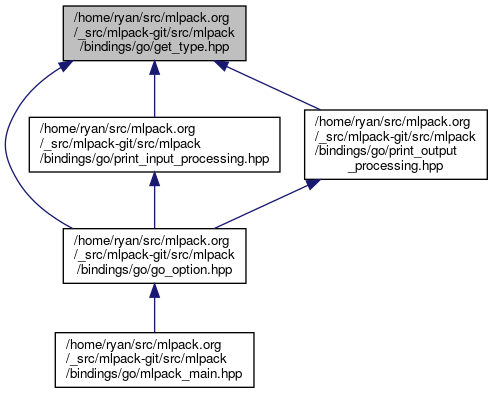get_type.hpp File Reference
Include dependency graph for get_type.hpp:

This graph shows which files directly or indirectly include this file:

Go to the source code of this file.
Namespaces | |
| mlpack | |
Linear algebra utility functions, generally performed on matrices or vectors. | |
| mlpack::bindings | |
| mlpack::bindings::go | |
Functions | |
template < typename T > | |
| std::string | GetType (util::ParamData &, const typename std::enable_if<!util::IsStdVector< T >::value >::type *=0, const typename std::enable_if<!data::HasSerialize< T >::value >::type *=0, const typename std::enable_if<!arma::is_arma_type< T >::value >::type *=0) |
template < typename T > | |
| std::string | GetType (util::ParamData &d, const typename std::enable_if< util::IsStdVector< T >::value >::type *=0) |
template < typename T > | |
| std::string | GetType (util::ParamData &, const typename std::enable_if< arma::is_arma_type< T >::value >::type *=0) |
template < typename T > | |
| std::string | GetType (util::ParamData &d, const typename std::enable_if<!arma::is_arma_type< T >::value >::type *=0, const typename std::enable_if< data::HasSerialize< T >::value >::type *=0) |
template < typename T > | |
| void | GetType (util::ParamData &d, const void *, void *output) |
| Function is used to generate the type names that are used in calls to functions like gonumToArma<type>() or setParam<type>(), and therefore what's returned isn't exactly the Go native type used for that parameter type. More... | |
template < > | |
| std::string | GetType< bool > (util::ParamData &, const typename std::enable_if<!util::IsStdVector< bool >::value >::type *, const typename std::enable_if<!data::HasSerialize< bool >::value >::type *, const typename std::enable_if<!arma::is_arma_type< bool >::value >::type *) |
template < > | |
| std::string | GetType< double > (util::ParamData &, const typename std::enable_if<!util::IsStdVector< double >::value >::type *, const typename std::enable_if<!data::HasSerialize< double >::value >::type *, const typename std::enable_if<!arma::is_arma_type< double >::value >::type *) |
template < > | |
| std::string | GetType< float > (util::ParamData &, const typename std::enable_if<!util::IsStdVector< float >::value >::type *, const typename std::enable_if<!data::HasSerialize< float >::value >::type *, const typename std::enable_if<!arma::is_arma_type< float >::value >::type *) |
template < > | |
| std::string | GetType< int > (util::ParamData &, const typename std::enable_if<!util::IsStdVector< int >::value >::type *, const typename std::enable_if<!data::HasSerialize< int >::value >::type *, const typename std::enable_if<!arma::is_arma_type< int >::value >::type *) |
template < > | |
| std::string | GetType< std::string > (util::ParamData &, const typename std::enable_if< !util::IsStdVector< std::string >::value >::type *, const typename std::enable_if< !data::HasSerialize< std::string >::value >::type *, const typename std::enable_if< !arma::is_arma_type< std::string >::value >::type *) |
Detailed Description
Template metaprogramming to return the string representation of the type for the Go bindings.
mlpack is free software; you may redistribute it and/or modify it under the terms of the 3-clause BSD license. You should have received a copy of the 3-clause BSD license along with mlpack. If not, see http://www.opensource.org/licenses/BSD-3-Clause for more information.
Definition in file get_type.hpp.


